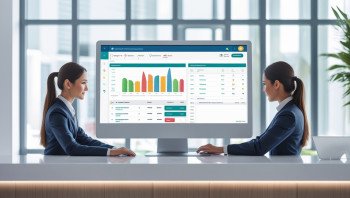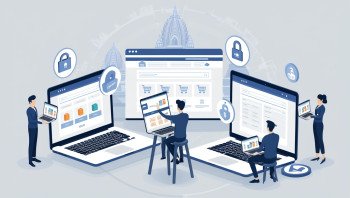In today’s digital age, online platforms for buying and selling products have revolutionized commerce, making it possible for individuals and businesses to connect, trade, and profit without the need for physical stores. A Buy and Sell Product Online Web Application is a system that facilitates these transactions through a web-based interface, enabling users to list their products for sale, browse offerings from others, and complete transactions securely and efficiently. This kind of platform can be an online marketplace, a personal seller-buyer interaction, or even a business-to-consumer (B2C) ecommerce site. The goal of such a web application is to create an easy-to-use, secure, and scalable platform for both buyers and sellers.
https://lexmetech.com/products/hospital-management-software
Core Features of a Buy and
Sell Product Online Web Application
User Registration and
Authentication
The foundation of any online marketplace is its users. For an application to function smoothly, it needs an efficient registration and authentication process. Users, whether they are buyers or sellers, must create an account to engage with the platform. Some critical aspects of this process include:
https://lexmetech.com/products/restaurant-management-software
Sign-Up & Login: Users
should be able to sign up using email, social media accounts, or even phone
numbers. Login must be secure and simple, with options to recover passwords or
reset accounts when necessary.
Account Management: Buyers and sellers can manage their profiles, update their personal details, upload product listings, and view purchase or sales history. Profiles can include a picture, name, shipping address, and payment preferences.
https://lexmetech.com/products/human-resource-management-system
Role-Based Access:
Different access levels for buyers and sellers must be implemented. Sellers
have additional rights like creating listings, setting prices, and managing
inventory, while buyers focus on browsing and purchasing.
Product Listings and CatLog
Management
One of the most important aspects
of a buy-and-sell web application is its product listing feature.
Sellers should have an intuitive interface to add products. Each listing must
provide sufficient details, including:
Title and Description:
Clear product titles and descriptions that help buyers understand the item.
This may include specifications, features, condition (new, used, refurbished),
and usage instructions.
Images: High-quality
images that allow buyers to view the product from different angles. Image zooms
and gallery views are crucial for better product visibility.
Pricing & Availability:
Sellers should easily set prices, manage stock levels, and include special
offers, discounts, or bulk pricing options.
Categories & Tags:
Products should be categorized for easy navigation (e.g., electronics,
clothing, furniture), and sellers can use tags to specify key attributes (e.g.,
eco-friendly, limited edition).
Shipping Details: Sellers
should indicate the shipping methods available, including pricing, shipping
regions, and delivery timeframes.
Advanced Search and Filters
A robust search functionality
is essential for an online marketplace. Buyers should be able to filter results
based on various criteria, such as:
Price Range: Let users
search for products within a specific budget.
Product Category: Filter
products by category, such as electronics, clothing, or furniture.
Condition: Filter products
based on whether they are new, used, or refurbished.
Location: Buyers can
filter by seller’s location to reduce shipping costs or find local options.
Sorting Options: Provide sorting by price, rating, newest listings, or relevance to help users find the most suitable products.
https://lexmetech.com/products/web-news-portal
Product Details Pages
Each product needs a detailed
product page to provide all the necessary information. These pages should
include:
High-Resolution Images:
Buyers need to see close-up views, zoom in on specific features, or even see
videos demonstrating the product.
Specifications and Features:
Full details such as size, weight, material, color, and brand.
Customer Reviews and Ratings:
Buyers rely on reviews from previous customers to make purchasing decisions.
Ratings and feedback about the seller’s service also help build trust.
Shipping Information: Buyers should know the cost, expected delivery time, and shipping policies upfront.
https://lexmetech.com/products/blogging-website
Shopping Cart and Checkout
A smooth checkout process
is essential for ensuring sales conversion. Features in this stage should
include:
Add to Cart: Buyers should
be able to add multiple items to their cart before proceeding to checkout.
Payment Methods:
Integration with multiple payment gateways (such as PayPal, Stripe, or credit
card processing services) is crucial for offering secure transactions.
Order Summary: Display a
detailed summary of the selected items, along with their prices, shipping
costs, taxes, and total cost.
Address and Shipping
Information: Buyers should easily add or choose a saved shipping address
for faster transactions.
Order Confirmation: After payment is processed, users should receive an order confirmation with transaction details and a tracking number.
https://lexmetech.com/products/affiliate-marketing-marketplace
Communication and Messaging
System
A messaging system allows
buyers and sellers to communicate directly. This is especially useful for
discussing:
Product Inquiries: Buyers
can ask sellers for additional details or clarification before making a
purchase.
Negotiation: Sellers and
buyers can discuss price reductions or special deals.
Shipping and Delivery
Information: Buyers can track the status of their shipments and communicate
with sellers regarding delivery issues.
Order Management and Tracking
Both buyers and sellers need
access to an order management system to track the status of their
orders. Key features include:
Order Status Updates: Both
parties should be able to view the order’s progress, from “order received” to
“shipped” to “delivered.”
History of Orders: The
system should allow users to review past transactions and reorder items with a
single click.
Returns and Refunds:
Clear, easy-to-follow procedures for returns, cancellations, and refunds must
be in place for consumer protection.
Ratings and Reviews System
A rating and review system allows
buyers to rate their experiences with products and sellers. This feature
ensures:
Seller Accountability:
Sellers who consistently provide great products and services receive positive
feedback and trust from other users.
Product Quality Transparency:
Buyers can read reviews about the quality and performance of a product before
purchasing.
Trust Building: The review
system helps users trust the marketplace and builds credibility for the
platform.
Benefits of a Buy and Sell
Product Online Web Application
Convenience for Buyers and
Sellers: The platform allows users to buy and sell products 24/7 from the
comfort of their homes or offices. Buyers do not need to visit multiple stores,
and sellers do not need to invest in physical storefronts.
Wider Reach and Global
Audience: Sellers can tap into a global customer base, expanding their
reach beyond local markets. Buyers can access products from different
geographical locations, offering them a wider variety.
Cost Efficiency: Sellers
avoid overhead costs like rent, utilities, and store maintenance. Buyers save
time and transportation costs, as they can shop from home.
Scalable Platform: An
online platform can easily scale to accommodate more products, users, and
transactions as the marketplace grows.
Enhanced Trust and
Transparency: The feedback and ratings system increase transparency,
enabling buyers to make informed purchasing decisions.
Technical Considerations for
Building the Web Application
Responsive Design: A
responsive design is essential to ensure that the application is accessible and
usable on all devices, including smartphones, tablets, and desktops.
Security: Implementing SSL
encryption for secure browsing and transactions is crucial. Secure payment
gateways and data protection techniques must be in place to safeguard user
information.
Database Management: An
efficient database management system is required to handle product listings,
user profiles, and transaction records. Using scalable databases like MySQL,
MongoDB, or PostgreSQL ensures smooth operation as the platform grows.
Scalability: The
application must be scalable to handle increased traffic and transactions,
particularly during peak shopping times. Cloud hosting services such as AWS,
Google Cloud, or Microsoft Azure can provide the necessary infrastructure.
SEO and Digital Marketing: Optimizing product listings for search engines (SEO) is critical for attracting traffic. Integrating tools for email marketing, discount promotions, and social media will help drive sales and grow the platform.
https://lexmetech.com/products/school-and-collage-admission-management-system
Conclusion
A Buy and Sell Product Online
Web Application is an essential tool in modern commerce, providing a
platform for users to engage in secure, convenient, and scalable transactions.
The key to success lies in building a user-friendly interface, implementing
strong security protocols, and offering valuable features that enhance the
buying and selling experience. By focusing on ease of use, efficiency, and
trust, such a web application can become a central hub for online shopping and
contribute to the growth of e-commerce globally.











